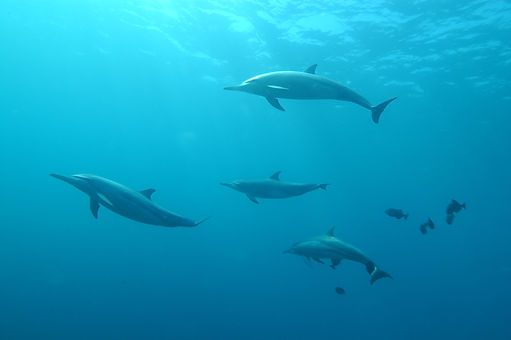

Cetaceans
Whales, dolphins and porpoises - conservation, research, education, protection
CRAM Foundation
Spain
CRAM Foundation is dedicated to the protection of marine life. Its main activity is the clinic and rescue of endangered marine species, which will later be reintroduced to the wild, such as turtles and dolphins. The Foundation also carries out research into marine species and ecosystems, and educates to raise awareness of the need to conserve the oceans. In addition to the state-of-the-art recovery center, with a technical and human team specially trained to assist marine species, as well as the Vell Marí, one of the few scientific sailboats dedicated to the exploration of the marine environment.
Caribbean Cetacean Society
Martinique, Guadeloupe
CCS's mission is to improve cetacean conservation within the Wider Caribbean Region and beyond. Created by two marine biologists from Guadeloupe and Martinique islands in 2020, and based in Martinique, the group aims to work at the Caribbean scale, to improve cetaceans conservation through international cooperation, via networking and practical research. Their initial "Ti Whale An Nou" project 'aims at determining population estimates, distributions, movement patterns, social structure and vocal clans of the Sperm whales (Physeter macrocephalus) in the Lesser Antilles. This project also allow to improve knowledge on the diversity, distribution and relative densities of the other cetacean species in the region.'
Center for Cetacean Research and Conservation
Cook Islands
CCRC was founded to conserve cetaceans and the ecosystems they inhabit. Their mission is to conduct benign research on the biology of cetaceans, to raise awareness of marine conservation issues, especially those concerning cetaceans, by: Providing curriculum enrichment and community outreach programs, Publishing scientific findings in both professional and popular formats through various media, Offering practical experiences for interns and volunteers, Producing educational films for television, and finally to collaborate with and facilitate organizations and individuals of complementary purpose. Closely associated Cook Islands Whale Research, they also have an office in Maine in the US.
Centro Studi Cetacei
Italy
The CSC was established in 1985 as a research group belonging to the Italian Society of Natural Sciences based at the Natural History Museum of Milan. One of the most important aims was to bring together all the Italian researchers and Institutions concerned with cetaceans, encouraging cooperation and studies in this field, and today has a sizable membership. The main project carried out by CSC is a national stranding network that collects data and samples from Cetaceans found stranded or beached along the Italian coasts. Amongst other work, the CSC intervenes in cases where sea turtles and cetaceans become entangled in fishing nets or beach, whether they are alive or dead. The "Luigi Cagnolaro" Recovery and Rehabilitation Center in Pescara is managed by the staff of the CSC and assists all mammals that require assistance and care, before releasing them into the sea, tagged for study
Centro de Conservacion Cetacea
Chile
Centro de Conservación Cetacea is a Chilean non-governmental and non-profit organization leader in the conservation of cetaceans and their aquatic ecosystems. Since its creation in 2001 it has achieved great accomplishments in scientific research, educational programs and conservation policies both in the country and in international forums. CCC objectives are:
- To develop non-lethal research programs on cetaceans and their aquatic ecosystems with special emphasis on threatened species. - To integrate the role of cetaceans in the functioning of marine ecosystems in the decision making process of marine conservation policies.
- To design and propose conservation and protection policies for cetaceans and their aquatic environment.
- To identify and evaluate anthropogenic impacts on cetacean populations in order to propose effective mitigation measures.
- To disseminate scientific information to promote active and informed participation of citizens, social organizations and government institutions in cetacean conservation.
- To strengthen cooperation in marine conservation strategies.
Cetacean Research & Rescue Unit
UK
Based in northeast Scotland, CRRU focuses on the study, conservation and understanding of UK cetaceans (whales, dolphins and porpoises) through scientific research and environmental education. They also provide a 24-hour veterinary rescue service for marine animals in distress. Their outreach programmes include internships, training and a citizen science project for reporting cetacean sightings.
Cetacean Society International
USA
CSI is an all-volunteer, non-profit organization involved in the conservation, education and research of cetaceans (whales, dolphins and porpoises) and their marine environment. Originally the Connecticut Cetacean Society (1974), CCS became Cetacean Society International and is a global leader in cetacean advocacy, with contacts in over 20 countries today. In 2013, CSI became the first US Founding Partner of the World Cetacean Alliance. Their stated purpose includes the following: Oppose rogue whaling and any attempts to overturn the ban on commercial whaling; Promote whale watching as an economic alternative to whaling in developing nations; Represent cetaceans as an NGO at the IWC (International Whaling Commission) and CITES (Convention on International Trade in Endangered Species), and assists regional workshops and meetings, amongst many other initiatives all with the common aim of increasing awareness of the plight of whales, dolphins and porpoises, and to ensure their protection.
Chelonia Limited
UK
Chelonia specialised in wildlife acoustic monitoring. Since 2006, Chelonia PODs have revolutionised the way cetaceans are studied in the wild. Using fully automated passive acoustic monitoring instruments, it is possible to detect porpoises, dolphins and other toothed whales (except sperm whales) by recognising the trains of echo-location sounds they produce to detect their prey, orientate and interact.
Cook Islands Whale Research
Cook Islands
One of the leading cetacean research organizations in the world, CIWR and its associate CCRC study and distribute information on the populations of cetaceans and other marine mammals in the Cook Islands, South Pacific. CIWR documents population abundance of humpback whales, beaked whales, sperm whales, dolphins, other cetaceans, marine mammals, turtles and sharks through opportunistic and systematic surveys.